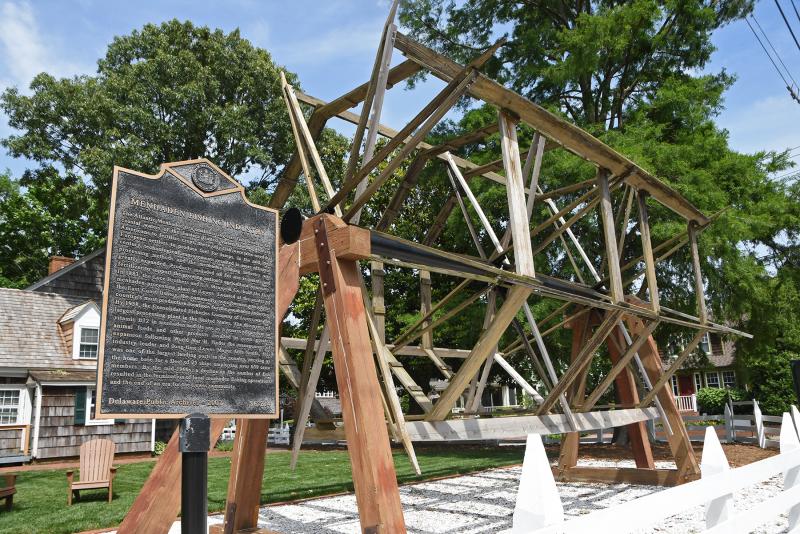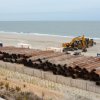The Lewes Board of Adjustment has voted 3-1 to uphold a commission’s authority to deny placement of a menhaden fishing net reel on the Lewes Historical Society’s campus.
Board member Luke Mette said the question before his body was not about the net reel, but rather the jurisdiction of the city’s historic preservation architectural review commission.
“The issue on the merits is not before this board today,” he said. “It simply is not. Our job is not to write the laws; it’s to interpret existing laws.”
The conflict began when HPARC voted in September 2020 to deny the historical society’s application to keep the net reel on its campus, where it had been moved after a restoration project. The LHS claimed HPARC did not have jurisdiction over its campus, and the board of adjustment Nov. 2 supported the commission’s authority.
The net reel had for many years sat along the Lewes-Rehoboth Canal behind the Lewes Life-Saving Station and next to the Lightship Overfalls. During a September 2020 meeting before HPARC, LHS Executive Director Jim Abbott said circumstances out of the society’s control required the net reel to be moved. After repairs in the spring and early summer of 2020, the net reel was reassembled on the society’s Shipcarpenter Street campus.
The group did not seek permission to do so, saying that they had not needed permission to place artifacts on their property in the past. Abbott testified Nov. 2 that he had a conversation with Mayor Ted Becker on the LHS campus, where Becker advised him to not speak with LHS neighbors before placing the reel on the campus. “Because if you do that, it will not happen,” Abbott said recalling the conversation.
When questioning City Manager Ann Marie Townshend Nov. 2, City Solicitor Glenn Mandalas confirmed the city’s mayor does not have the authority to personally approve or deny placement of structures.
Mandalas also argued that city code regulating the historical society’s campus and other properties in the cultural/historic zone did not exist until 2019, so historical society officials had not needed to get prior permission for other exhibits and artifacts on its campus.
After a small group of neighbors objected to the net reel’s new location, the historic preservation commission determined it did not fit in with the rhythm and scale of the streetscape, and denied an application for it to remain in place.
Abbott said the net reel is important in telling the 20th century history of Lewes, particularly during a pre-civil rights time when African Americans and Caucasians worked side by side at Fish Products Company near today’s Cape May-Lewes Ferry terminal.
Abbott said the net reel would be included in a walking tour that educates the public about the contributions African Americans have made to the Lewes community. The tour is being developed by the Lewes African American Heritage Commission.
The dimensions of the cylindrical wooden reel, which was used to pull cotton fishing nets out of saltwater to dry, are 19 feet in height, 32 feet in length and 18 feet in depth.
LHS attorney Mark Dunkle said the city erred when it combined the historic preservation commission and the commercial architectural review commission into one group in February 2019. Prior to the creation of HPARC, he said, neither group had jurisdiction over the cultural/historic zone, and each group’s primary responsibility dealt with the appearance of homes or commercial businesses.
Board of Adjustment member Denise Emery, the lone vote in favor of the LHS request, said she believed the city overlooked the cultural/historic zone when it created HPARC. She also agreed with an argument made by Dunkle that LHS is a museum that is permitted by right in the cultural/historic zone.
“I have a problem with one entity having jurisdiction over another entity that is a museum,” she said. “It isn’t a structure that will be lived in; it’s preserving the cultural history of Lewes.”
Dunkle argued that the LHS campus is an outdoor museum and that if it is limited to displaying only artifacts and objects that fit in with the buildings of the neighborhood, then it will not be much of a museum.
“HPARC doesn’t have the tools in its evaluation to make any informed decision about a museum exhibit as it is defined in Lewes code itself,” he said.
Dunkle called several witnesses to reinforce the cultural significance of the net reel, including LHS President Elizabeth Owen, LHS board member Bill Collick, LHS Executive Director Jim Abbott, Delaware Division of Historical and Cultural Affairs Director Tim Slavin, and former HCA Director Dan Griffith.
Read more in the Friday, Nov. 5 edition of the Cape Gazette.
Nick Roth is the news editor. He has been with the Cape Gazette since 2012, previously covering town beats in Milton and Lewes. In addition to serving on the editorial board and handling page layout, Nick is responsible for the weekly Delaware History in Photographs feature and enjoys writing stories about the Cape Region’s history. Prior to the Cape Gazette, Nick worked for the Delmarva Media Group, including the Delaware Wave, Delaware Coast Press and Salisbury Daily Times. He also contributed to The News Journal. Originally from Boyertown, Pa., Nick attended Shippensburg University in central Pennsylvania, graduating in 2007 with a bachelor’s degree in journalism. He’s won several MDDC awards during his career for both writing and photography. In his free time, he enjoys golfing, going to the beach with his family and cheering for Philadelphia sports teams.






















































